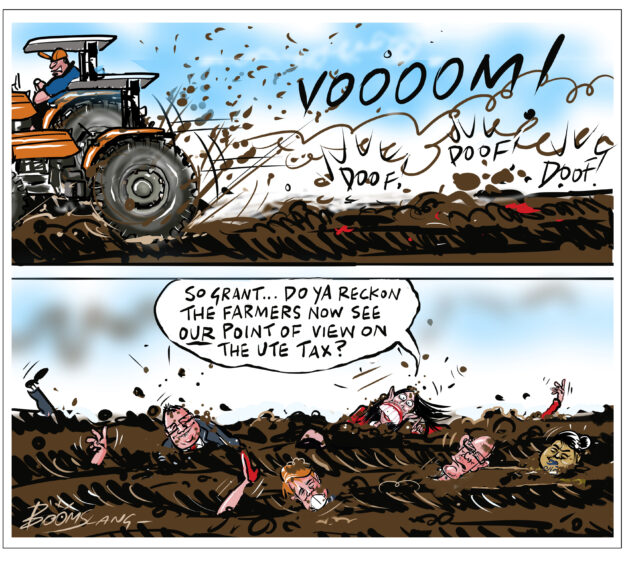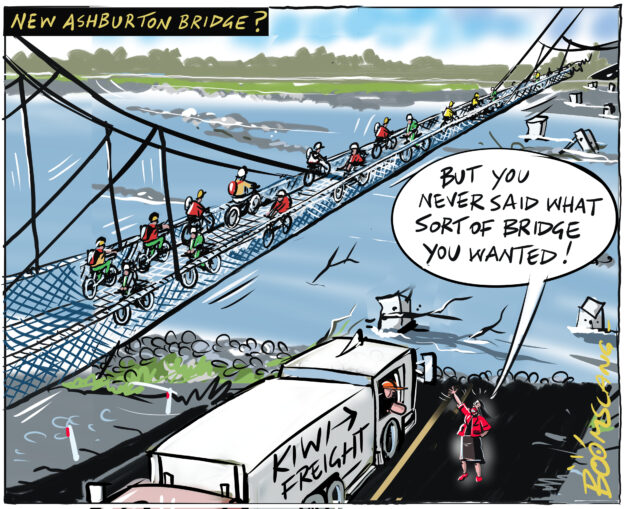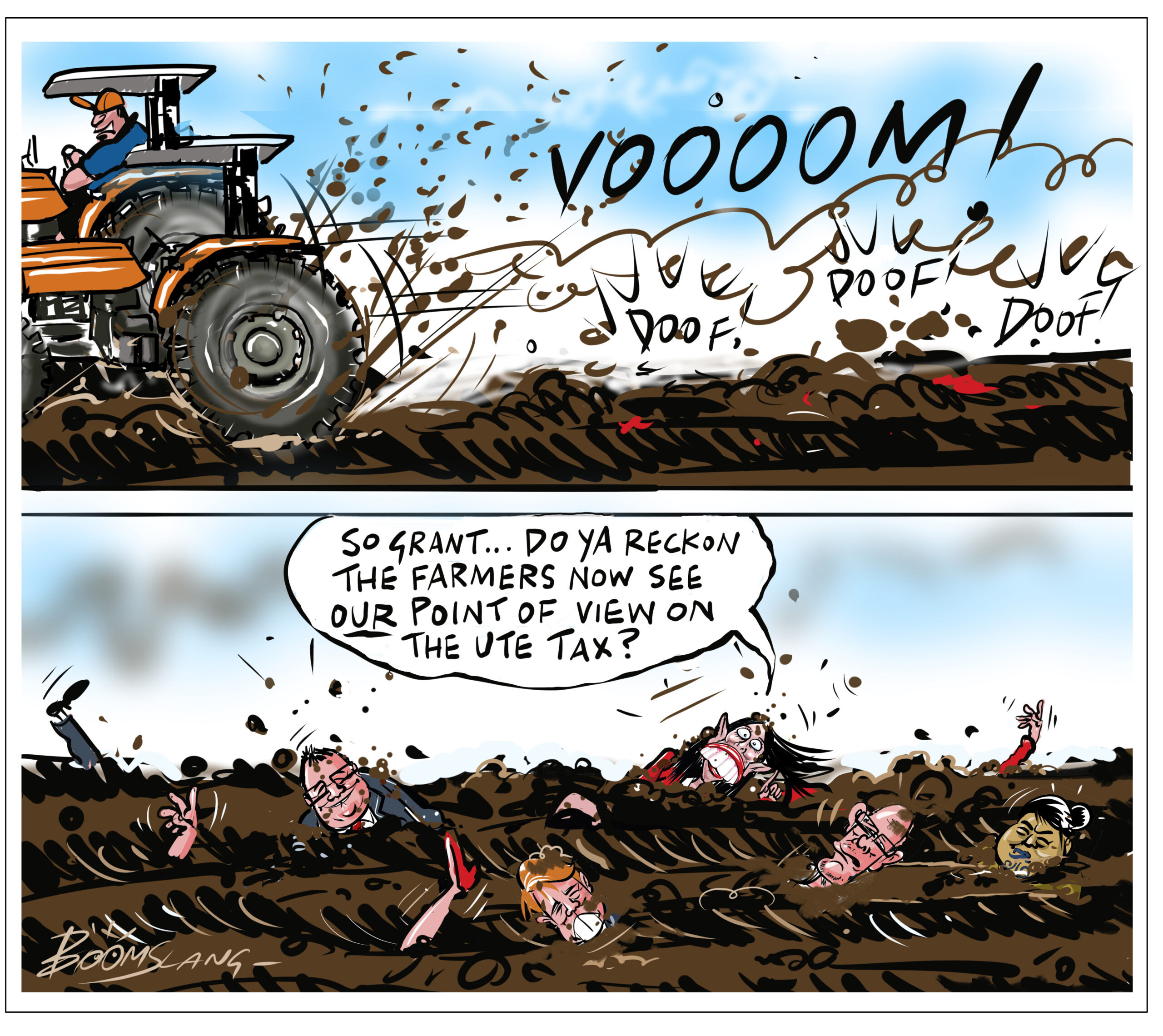Bryce Edwards
Political Roundup
It’s nearly a week since the “Howl of a Protest” took place throughout the country, and we’re still talking about the rural revolt. What are the farmers’ concerns? Are they legitimate? Has the rural-urban divide become too deep, and will any of this have an impact on politics in Wellington?

What’s behind the rural revolt?
One of the best pieces on what’s behind the rural revolt is yesterday’s article by Laura Walters: How real is the rural-urban divide? She argues division is being stoked between farm and town, including by the media and those who wish to explain the protests as farmers being out of touch. Instead, she paints a picture of farmers who are on board with environmental issues but have problems with a government that they believe isn’t listening.
Walters reports Federated Farmers national president Andrew Hoggard saying:
“Everyone agrees with the big picture direction, but these policies, regulations and legislation are coming out in random orders. It’s like there’s not a workplan behind it.”
And given that his own organisation wasn’t behind the protests, but instead focused on behind-doors talks in Wellington, Hoggard concedes: “Maybe we’ve just been a little too polite. Maybe we need to be blunter.”
On Wednesday, Canterbury farmer Craig Hickman gave a good explanation for the protests in his opinion piece, This might have been our first successful farmer protest.
He starts out by explaining his aversion to such protests:
“I’ve never made a secret of the fact I’m no fan of farmer protests; there had never been a successful one in my living memory and there has been a tendency recently for them to backfire and paint farmers in a bad light, usually as ignorant racist misogynists.”
But last week was different, as “the sheer volume of frustrated and disillusioned farmers drowned out the minority of fringe idiots, turning them into an irrelevant sideshow.”
Here’s his summary of farmer feeling:
“The common theme was that the pace and change of Government reform has been overwhelming and is taking its toll. A relentless tidal wave of change that often seems to occur with little consultation and without any clue as to how they will be practically implemented, and no comprehension of the flow on effects they will have. It was a collective outpouring of anger at being constantly painted as convenient villains for political gain.”
Farmer complaints
Groundswell New Zealand, who organised the protests, has published a list of seven concerns, including policies on freshwater management, the “ute tax”, the lack of overseas workers, changes to the Emissions Trading Scheme, the Significant Natural Areas programme, new rules about indigenous biodiversity, and the high country land reforms. This is explored in depth by Georgia Forrester in her article: What are Aotearoa’s farmers actually protesting about this Friday?.
Farmer Shelley Krieger has usefully outlined Why farmers protested in NZ towns and cities. She explains that some of the more prominent issues aren’t actually so central to concerns:
“The ute tax was just an add-on. It was new legislation that came out after the protest had already been organised.”
For Krieger, the Significant Natural Areas rules are a particular concern:
“These are areas of people’s farm land or lifestyle blocks that the Government is getting the councils to survey. This is native blocks of land that have wild flora and wild animals that pass through it. Once parts of land are classified as an SNA you lose your rights to that land, cannot farm it or build on it. You have to fence it off at your own cost and still pay the rates on it but you can no longer use it. In some instances it is 80-90 per cent of people’s land.”
For a deeper exploration of this, see Wednesday’s article by George Driver: What are SNAs and why are farmers protesting them?.
Looking at the complaints of farmers, Herald political editor Claire Trevett writes:
“The ute tax came to be seen as the main thrust of the protest. But for the farmers at least, it was not about the ute tax. The ute tax was simply the salt being rubbed into the wound. It would not have escaped them that the Prime Minister said Cabinet considered exempting farm and work utes from the fee, but decided it was too complicated. Farmers will not have the luxury of opting out of Government regulations because they are too complicated. And that is why the farmers protested. The protest was the rural sector making it clear they felt besieged by the pace and scale of Government reforms”
– see: Dismiss protesting farmers as rednecks at your peril, Prime Minister (paywalled).
Trevett explains that farmers aren’t opposed to the Government’s land reform and environmental goals, but rather, some of the details and process:
“Farmers have accepted the need for some reform, and have worked with the Government on it. But farmers are caught up in almost all of the various streams of reform on the environment and climate change. They will be hit by moves to reduce transport emissions, pricing on agricultural emissions, higher environmental standards on water, and protection of sensitive land. No matter how well signalled much of it has been, it is now all hitting at once. It is hitting at the same time as other reforms in workplace relations, immigration, the Resource Management Act and local government, all of which also impact on farmers.”
The Herald also ran an editorial explaining that farmers feel they are having to carry too much of the environmental reform effort, while others face fewer sacrifices:
“Most of the protesters – likely to number thousands – will be farmers, coming in force to town because they’re fed up with being targeted for spiralling environmental compliance costs and taxes – and as they see it, doing the heavy lifting for New Zealand’s climate change response… They feel dumped on as easy targets and an unappreciated minority”
– see: All is not well down on the farm as city people will find out today (paywalled).
Writing in the Herald on Sunday, columnist Kerre McIvor also explained the long list of farmer complaints – from the “ute tax” through to a feeling that the Government is prioritizing other voters in its spending decisions:

“It’s the Ashburton Bridge being out of commission with no plans to build a better, safer link to the rest of the South Island, when $785 million has been announced for the Boomers’ Bike Bridge to Birkenhead”
– see: Farmers are riled up over everything – and they’ve got a point (paywalled).
Please share so others can discover The BFD.

